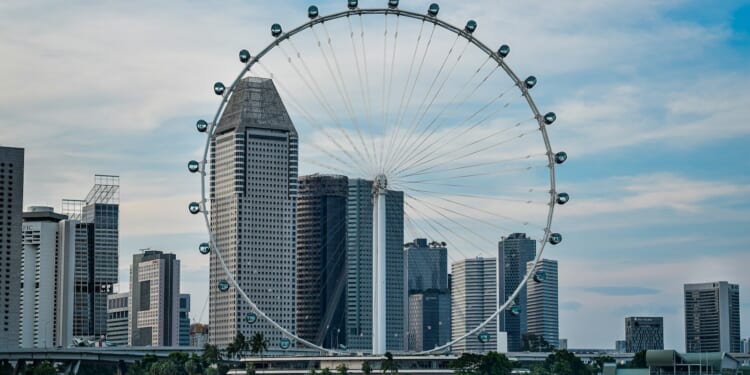Rafe Fletcher is the founder of CWG.
I recently escaped Singapore’s year-round humidity for a few days of autumnal sunshine in Budapest. I was speaking at the Brain Bar festival, sometimes known as “South by Southwest on the Danube”. It featured art and technology, music, and debates, with a small tribute to Charlie Kirk in the form of a ‘change my mind’ stand. Speakers are the main attraction. Hungary’s rightward turn under 15 years of Viktor Orban means themes are often contrarian. But it’s not an echo chamber. Left-wing economist Mariana Mazzucato sits alongside Peter Thiel and Jordan Peterson in the event’s alumni.
The big main-stage debate was between Viktor Orban’s political director Balazs Orban (no relation) and former Swedish Prime Minister Carl Bildt. Orban was pugnacious, arguing the EU thwarted Hungary’s autonomy. The 2015 refugee crisis still lingered as a sore point, when Angela Merkel’s hospitality meant hundreds of thousands transiting through Hungary to reach Germany. Orban believes this moral grandstanding continues today in EU economic policies. He criticised tariffs on China’s electric vehicles and its response to Trump’s trade renegotiations, calling it needlessly antagonistic. He framed his position to appeal to the young audience. Hungary wants this demographic to be prosperous. That means good relationships with the two superpowers leading the AI revolution.
I referenced this in my later panel on Singapore. What can countries like Hungary learn from its model? Managing geopolitical sensitives was top of the agenda. Hungary’s foreign policy is very nuanced. Viktor Orban is a darling of the MAGA movement for his anti-globalism and cultural conservatism. Yet Hungary is also China’s closest partner in the EU. Orban is one of Benjamin Netanyahu’s oldest friends and Israel’s most steadfast ally in the EU. Hungary recently withdrew from the International Criminal Court (ICC) after the ICC issued an arrest warrant for Israel’s Prime Minister. But Hungary is also a great friend to Israel’s fervent critic Turkey, supporting its EU accession.
I asked Singaporean investor Hian Goh how Singapore managed a similarly realist stance. China is the city state’s largest trading partner, but Singapore also maintains very warm relations with the US. Goh said exercising such neutrality required leverage. Singapore has assets, running budget surpluses and able to draw upon over a trillion dollars in sovereign wealth funds. So, China cannot buy influence through its Belt & Road initiative, which creates debt burdens through its financing of infrastructure. America, meanwhile, gets access to Singapore’s Changi Naval Base. It’s a vital base in one of the world’s busiest shipping lanes. These assets stop Singapore becoming beholden to either power or being bullied into picking sides.
Hungary cannot offer such advantages. Its own pick-and-choose foreign policy is driven more by historical narrative than substance. I read Norman Stone’s Hungary: A Short History on the flight over to Budapest. The late British historian spent his final years in Hungary as an advisor to Viktor Orban. His sympathetic account of the Central European nation tells of a once dominant Middle Ages kingdom becoming an imperial pawn under Ottoman and Habsburg rule. In the 20th century, Hungary remembers both wars as ones they were dragged into by its surrounding sphere of influence. After defeat in the first, the Treaty of Trianon took away two thirds of Hungary’s land. In 1945, Budapest was the site of the Nazis’ last stand, engendering much Soviet bitterness that characterised its harsh rule as a Cold War satellite.
I know far too little to judge whether Hungary can rightly paint itself of a victim of circumstance. But that history helps explain why Orban’s schtick has largely proved popular. Ideological alliances haven’t served Hungary well and bloody-minded independence looks a better bet.
The UK’s foreign policy is similarly shaped by its history. Parts of the right advocate a similar independence stemming from vindication, rather than grievance. The UK stood alone against Nazi Germany. Combined with the legacy of empire, it feeds a sense of British exceptionalism. It was this bluster that helped fuel the patriotic swell behind Brexit. As a keen supporter at the time, I now see some of this optimism was misplaced. The promise of great new trading relationships with China and India collided with reality. The former is motivated by CCP strategic goals and the latter, as Carl Bildt noted, a notoriously difficult counterparty.
But the flip side of this triumphalism is at best managed decline, where the UK resigns itself to a B team role, necessarily pooling resources with smaller powers. At its worst, it’s a different kind of grievance politics that actively disowns the UK’s own history and insists the country must make amends. The latter is particularly pernicious in destroying the real assets the UK still possesses. Education is one prominent example. Labour’s VAT on private schools not only attacks aspiration but undermines an export sector renowned worldwide. When foreign ministers want to send their kids to Eton, the UK holds the cards. Similarly, UK universities still hold prestige abroad. They will be vital in profiting from rampant AI spend, a sector where the UK stands far above European peers. Fraser Nelson references Larry Ellison’s investment into Oxford and the relative affordability of UK AI workers as evidence that Trump’s promised investment is more than a quid pro quo for dinner with the King. So why is the Oxbridge growth corridor still only mooted and not built? The Conservatives, in pandering to NIMBYism, are just as culpable as the current government.
The closing speaker at Brain Bar was the British physicist Geoffrey West, whose “law of scale” shows that properties grow in predictable ways. Applied to nations, the UK and Hungary cannot enjoy the super-linear advantages of superpowers or supranational blocs. Their leverage is inherently limited. Yet West also notes that cities can thrive indefinitely by innovating. Singapore proves this as a city-state, using its assets creatively to maintain autonomy. The UK, unlike Hungary, has the resources to do the same. Its universities, legal system, financial markets and cultural capital are assets which could allow it to punch far above its weight. But to do so, it needs confidence in its own comparative strengths. That identity means shedding both nostalgia and repentance about past scale.








![Keith Ellison Caught Promising to Fight State Agencies for Somali Fraudsters [WATCH]](https://www.right2024.com/wp-content/uploads/2026/01/Keith-Ellison-Caught-Promising-to-Fight-State-Agencies-for-Somali-350x250.jpg)


![Florida Officer Shot Twice in the Face During Service Call; Suspect Killed [WATCH]](https://www.right2024.com/wp-content/uploads/2025/12/Inmate-Escapes-Atlanta-Hospital-After-Suicide-Attempt-Steals-SUV-Handgun-350x250.jpg)





